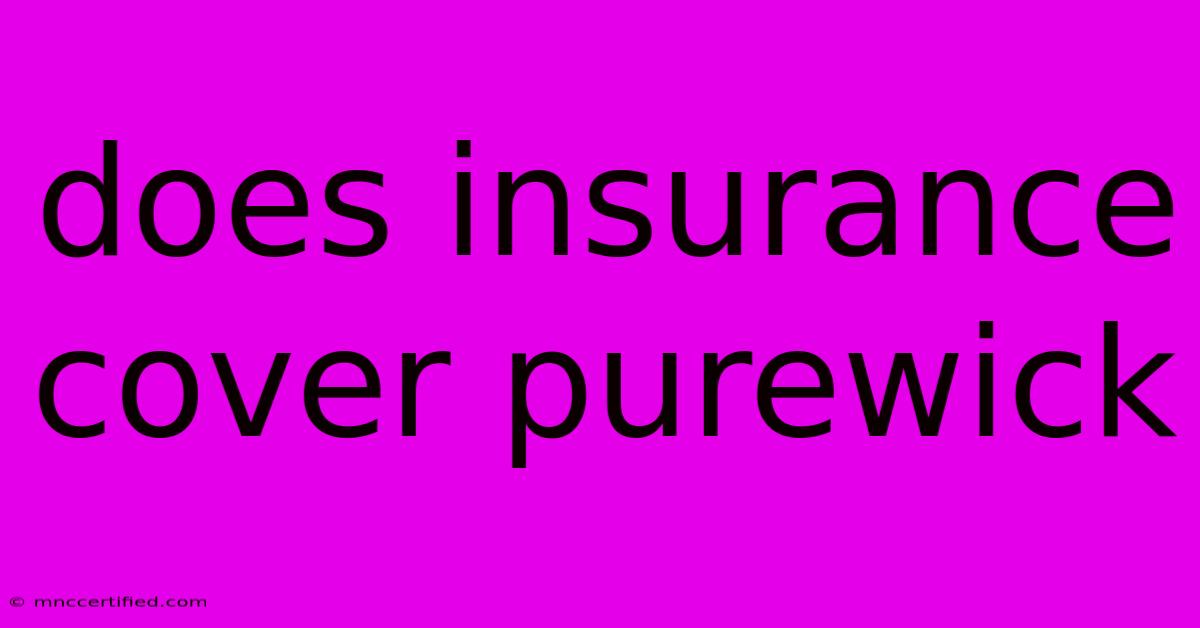Does Insurance Cover Purewick

Table of Contents
Does Insurance Cover PureWick? Navigating Coverage for CBD Products
The burgeoning popularity of CBD products, including those like PureWick, raises important questions about insurance coverage. Many people wonder, does insurance cover PureWick or similar CBD products? The short answer is: it's complicated and depends on several factors. There's no simple yes or no.
Understanding the Insurance Landscape and CBD
The insurance industry is still navigating the legal and regulatory landscape surrounding cannabidiol (CBD). Because CBD's legal status varies widely by location and its inclusion in many products is relatively recent, insurance providers haven't established uniform policies. This means coverage can differ dramatically depending on your specific plan, your location, and the nature of your claim.
What Factors Influence Coverage?
Several key factors determine whether your insurance might cover expenses related to PureWick or similar CBD products:
-
Your Insurance Plan: Individual health insurance plans vary widely in their coverage. Some might explicitly exclude alternative therapies like CBD, while others might offer limited coverage under specific circumstances. Review your policy documents carefully, or contact your insurance provider directly. Medicare and Medicaid generally don't cover CBD products.
-
The Nature of the Claim: Insurance coverage is usually tied to a specific medical condition or treatment. If you're using PureWick to treat a diagnosed medical condition and your doctor recommends it as part of your treatment plan, you might have a stronger case for coverage. However, if you're using it for general wellness or preventative purposes, the likelihood of coverage decreases significantly.
-
State and Local Laws: The legality of CBD varies depending on your state. In areas where CBD is legally regulated and sold, insurance companies might be more open to considering its use in claims. However, in states with stricter regulations or outright bans, coverage is less likely.
-
Product Purity and Source: Insurance providers may require proof of the product's purity and source. Using a reputable brand with third-party lab testing results demonstrating the product's CBD content and absence of harmful contaminants can significantly improve your chances of getting a claim approved. This information may be necessary for supporting a claim for PureWick.
How to Increase Your Chances of Coverage
While there's no guarantee of insurance coverage for PureWick or similar products, you can improve your chances by:
-
Consulting Your Doctor: Discuss your use of PureWick with your doctor. If they deem it a medically necessary treatment for a specific condition, they can provide documentation supporting your claim. This documentation should clearly articulate the medical necessity of using the product.
-
Thorough Policy Review: Carefully review your insurance policy to understand its exclusions and limitations regarding alternative therapies. Look for clauses related to "experimental" or "unproven" treatments.
-
Detailed Documentation: Maintain detailed records of your PureWick purchases, usage, and any related medical expenses. Keep receipts, doctor's notes, and any other relevant documentation.
-
Contacting Your Insurer: Don't hesitate to contact your insurance provider directly to discuss your specific circumstances. Clearly explain your situation and ask about their policy regarding CBD products.
Conclusion: Proactive Steps are Key
While insurance coverage for PureWick and similar CBD products isn't guaranteed, understanding the factors influencing coverage and taking proactive steps can improve your chances of receiving reimbursement for related expenses. Always consult your doctor, carefully review your policy, and maintain thorough documentation. Remember, the regulatory environment surrounding CBD is constantly evolving, so staying informed is vital.
Disclaimer: This article is for informational purposes only and does not constitute medical or legal advice. Always consult with a qualified healthcare professional and legal expert for advice tailored to your specific circumstances. The information provided here should not be considered a substitute for professional medical or legal counsel.

Thank you for visiting our website wich cover about Does Insurance Cover Purewick. We hope the information provided has been useful to you. Feel free to contact us if you have any questions or need further assistance. See you next time and dont miss to bookmark.
Featured Posts
-
Cheap Car Insurance Texarkana
Nov 29, 2024
-
National Dog Show Pug Triumphs
Nov 29, 2024
-
Misfits Boxing 19 Gib Vs Slim Results
Nov 29, 2024
-
Us Embassy Celebrates Family And Unity
Nov 29, 2024
-
Slim Loses To Gib In Misfits Boxing
Nov 29, 2024